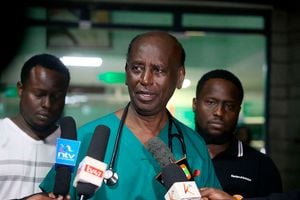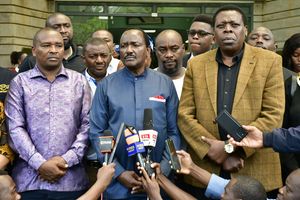
Senior Counsel Paul Muite (left) confers with former Deputy President Rigathi Gachagua inside the Senate in Nairobi on October 17, 2024. Right: Karen Hospital founder Dr Dan Gikonyo.
The Karen Hospital was on Thursday October 17 sucked into the drama surrounding the impeachment of Rigathi Gachagua as the deputy president, and its co-founder is no stranger to the country’s murky political arena.
The hospital was mentioned in the Senate by lawyer Paul Muite as the country waited with bated breath to know the whereabouts of Mr Gachagua, who failed to turn up in the House for the afternoon session for cross-examination after being there all morning.
Mr Gachagua’s lawyer told senators that the embattled deputy president had been rushed there after falling seriously ill.
As the tension unfolded, President William Ruto’s ally Dennis Itumbi, the Head of Creative Economy and Special Projects in the Executive Office of the President, alleged through his social media pages that Mr Gachagua’s hospitalisation was part of “a broader strategy to delay and prolong impeachment proceedings.”
The hospital’s co-founder, Dr Dan Gikonyo, is one of the few doctors in Kenya who have over the years publicly taken a political stand. In his autobiography, Doctor at Heart, Dr Gikonyo says that he once took life membership of the Democratic Party and that was because he held (and still holds) the party’s co-founder, the Mwai Kibaki, in high regard.
On Thursday, Dr Gikonyo was in his element as cameras rolled. As journalists sought to know the condition Mr Gachagua was in, his response was that in such a case that involved chest pains, they would require “to keep him at least 48 to 72 hours to make sure that he’s safe.”
His knowledge in handling press briefings was honed in the early 2000s when he was charged with providing updates about presidential candidate Kibaki, who was involved in a road accident just weeks to the 2002 General Election.
Dr Gikonyo writes in his recently released autobiography, Doctor at Heart, about the need to give the country hope over Mr Kibaki’s condition then. He recalls being advised to “measure his words” so as to “give Kenyans hope” over the matter.
“I was sure of a full recovery. We shared the same hope with the nation. That was the first of the many press conferences that I had to do in the following months,” he writes.
And so, when he insisted that Mr Gachagua was stable – hours after Mr Muite had told the Senate that Mr Gachagua was seriously ill – it would appear that he was staying true to the advice he was given. He also made sure to mention that he had permission to speak on the matter.
“I must say I have his permission to talk to you,” he said in the address that happened a few minutes to 8pm on Thursday as impeachment proceedings continued in the Senate.
Incidentally, Mr Muite was in the same political axis as Dr Gikonyo during the clamour for multi-party democracy in the early 1990s.
Out of personal conviction, Dr Gikonyo chose to treat anti-government voices who had either been jailed or battered by the State.
In a recent interview with Nation.Africa, Dr Gikonyo said he has “always chosen to stand with the truth; to stand with honest people and to stand with what is right.”

Karen Hospital Chief Cardiologist and Founder Dr Dan Gikonyo addresses the media on the state of Deputy President Rigathi Gchagua on October 17, 2024.
In the 1990s, Mr Muite was firmly in the anti-government corner, more so in the “Young Turks” brigade. He was being hunted by Moi government operatives during the first Saba Saba rally, and he was given refuge by Smith Hempstone, the then US ambassador.
Dr Gikonyo writes that the shadow of Mr Muite was looming large in denial of permission to start The Karen Hospital. This is because the East Africa Heart Institute, the company seeking to establish the hospital, had one board member, George Waruhiu, who was a Muite ally.
“We were denied registration by the Kanu government because George Waruhiu was a partner to lawyer Paul Muite, who was seen as anti-Kanu, owing to his strong advocacy for human rights,” writes Dr Gikonyo.
The permit to establish the facility came in 2003 during the administration of Mwai Kibaki, who had taken up Dr Gikonyo as his personal physician in 2002. The relationship lasted until Mr Kibaki’s death in 2022.
Dr Gikonyo’s involvement in the Kibaki administration saw him feature in John Githongo’s exposés on graft in government.
As claimed in the book It’s Our Turn to Eat on the back of a secret recording, the doctor went to London alongside former minister Amos Kimunya to coerce Mr Githongo not to release any information that would jeopardise the 2005 constitutional referendum.
However, in his book, Dr Gikonyo denies the allegation. He notes that he was simply visiting Mr Githongo to check on him due to a request by the latter’s mother. He says that the later exposure of their meeting made him feel “betrayed by a friend”.
Dr Gikonyo has previously played his part in offering relief to politicians being squeezed hard by the government, and he writes that it was due to his reports that Charles Rubia, Kenneth Matiba and Koigi wa Wamwere were released from prison during Mr Moi’s administration.
He also found a way of sneaking letters from Mr Wamwere’s family in Norway to the politician who was then admitted at the Nairobi Hospital.
On Thursday, one observer posted on social media platform X that it was overly dramatic when Dr Dan Gikonyo emerged to address the media wearing his doctor’s scrubs and with a stethoscope in tow.
However, a check of some of his previous TV interviews shows that he prefers to dress that way when being interviewed in hospital.
That Dr Gikonyo is a politically conscious medic is clear even from his autobiography. At least seven of the book's 22 chapters address political issues. The book also includes a transcript of an unpublished Mwai Kibaki interview.







